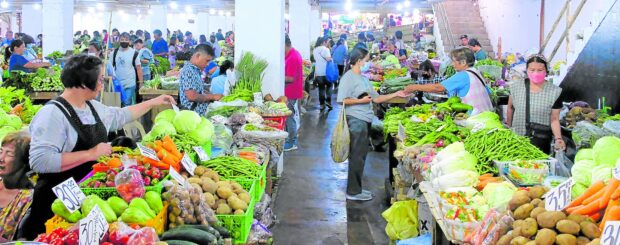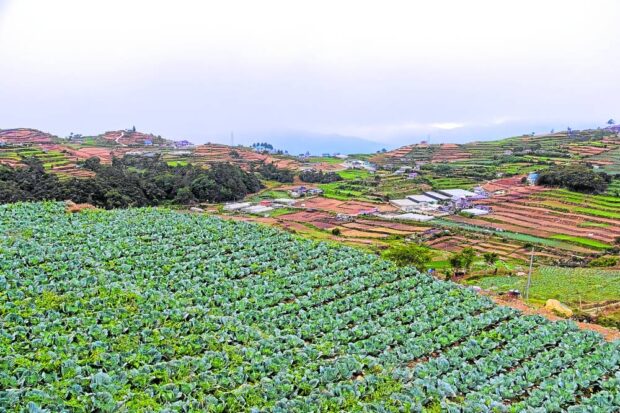Trade pact displacing Cordillera crops, says farmers’ group

FRESH The Baguio City public market, shown in this photo taken in April, offers residents and tourists a variety of fresh and cheap vegetables harvested from farms in the Cordillera. —NEIL CLARK ONGCHANGCO
BAGUIO CITY—Legally imported vegetables are again displacing locally grown produce in Metro Manila markets, and salad vegetable producers in Benguet province are fearful that this is due to an Asia- Pacific free trade agreement that has been “abused.”
The League of Associations at the La Trinidad Vegetable Trading Area urged the Benguet provincial board and the Department of Agriculture (DA) to review provisions of the Regional Comprehensive Economic Partnership (RCEP) that apply to fresh vegetables.
In a set of Sept. 15 letters obtained by the Inquirer on Wednesday, the group, represented by its president Nora Ganase and her Divisoria (Manila) cluster counterpart Rodolfo Bulawan, insisted that the RCEP “may be abused or used as an excuse [to explain] the proliferation of smuggled vegetables.”
Buyers from Metro Manila, particularly traders from Pasig City, have either reduced or stopped orders for broccoli and cauliflower produced in Benguet’s vegetable gardens, and have shifted to imported products sold in market trading centers in Manila, Sariaya town in Quezon province and Batangas province.
RCEP was ratified by the Senate in February despite objections from the agricultural sector, and took effect in the country in June. The agreement involves Australia, China, Vietnam, as well as Japan, South Korea, Thailand, Brunei, Cambodia, Indonesia, Laos, Malaysia, Myanmar, New Zealand and Singapore.
Article continues after this advertisementThe league appealed to government enforcers to allow only the entry of processed imported vegetables.
Article continues after this advertisement“Vegetable entries to the country must be limited to processed only. Fresh vegetables should not be included,” it said.

MOUNTAIN GROWN Vegetable farms in Benguet, like these gardens in the village of Paoay in Atok town, supply markets in Metro Manila with fresh cabbage, potatoes, carrots, broccoli
and cauliflower daily. Farmers, however, are complaining that imported produce are displacing local salad vegetables. —NEIL CLARK ONGCHANGCO
Price cap
It requested the government to revisit the RCEP’s internal rules and regulations to determine if entry protocols are strict and would protect local produce.
The league also urged the government to consider imposing ceiling and floor prices for vegetables to prevent “skyrocketing prices” in the markets that have justified importation.
Historically, high vegetable prices allowed traders and suppliers to negotiate for much lower wholesale buying prices for locally grown crops that cut farmers’ revenues, the league said.
Benguet and parts of Mountain Province and Ifugao supply 80 percent of Metro Manila’s daily salad vegetable demand. Benguet ships out an average of 1.7 million kilos of vegetables daily, and a high of 3.3 million kilos during periods of oversupply, the league said.
It said the free trade deal should have policies that “empower” local farmers to be competitive.
“This early, we are experiencing the effects of RCEP when our production is not that high,” the group said, citing this year’s strong typhoons, like “Egay” (international name: Doksuri) in July, which damaged and delayed seasonal cropping.
Lamenting the impact of competition with foreign vegetables in the markets, it said medium-sized and third-class carrots are being given away as relief items or bought for as low as P5 a kilo, which is way below the cost of production.
“Due to the typhoons and monsoon rains that hit our region, only 10 percent of our total carrot production had been sold for P60 to P130 per kilogram,” the group said.
It added: “Disposers and suppliers have been complaining of a supply glut even if the volume of carrots and the other vegetables is not that high.”
Impact
The group has been monitoring the impact of imported potatoes on Benguet varieties harvested before the storms hit to prevent bigger losses.
Benguet transported potatoes categorized as “marble,” “extra large” and “triple large.” Extra large potatoes sell for P130 a kilo.
But like carrots, only a smaller volume of potatoes reached the markets because farmers, who usually harvest six tons of potatoes, ended up harvesting only two tons, the group said.